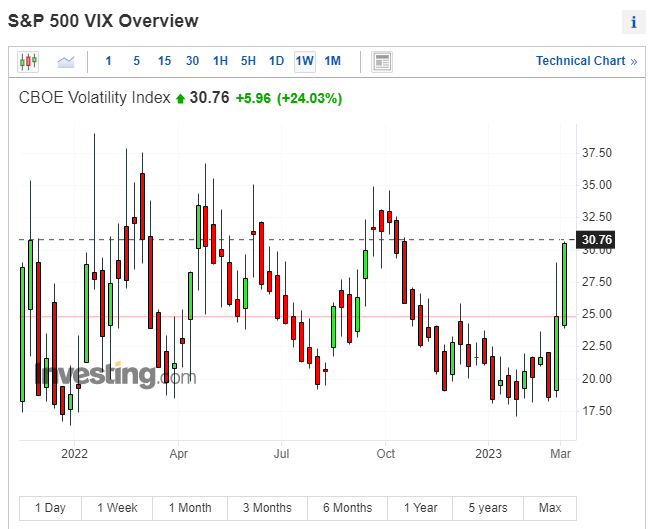The collapse of Silicon Valley Bank and the ensuing contagion is the biggest story now. A few days ago I said this is worse than 2008. It seems I was right:
1. The suddenness of the 2023 crisis exceeds the 2008 global financial crisis. It hasn’t been a week, and already two major banks, Signature Bank and Silicon Valley Bank, have failed. A third one, First Republic Bank (FRP), is teetering (the stock is down 60% this morning as writing this). 2 out of 3 of the largest bank failures ever occurred in a one-week period, compared to Washington Mutual failing in 2008.
I wonder if FRP identifies as ‘broke’?
Slender Asian girls, the eternal victims of American society. pic.twitter.com/0aElhARBKv
— Richard Hanania (@RichardHanania) March 13, 2023
2. The crisis has gone full-malignant spreading all over the financial system, including Schwab, down 20% this morning, too, even though its business model is mostly unrelated:
“Be greedy when others are fearful”$SCHW (Charles Schwab) -17%$USB (US Bancorp) -10%$FRC (First Republic Bank) -75%$WAL (Western Alliance Bancorporation) -77%$CUBI (Customers Bancorp Inc) -54%$BAC (Bank of America) -6%
— andy 🇨🇺🎮💻 (@bas3dlatino) March 13, 2023
This was despite the bailout yesterday (which is not called a bailout by the fed, but that is what it was). The Vix is up another 20% today, to 30 points. Had the bailout fallen through, likely the S&P 500 would be down 5% or more instead of flat.
3. Most of the deposits are not FDIC insured, unlike 2008.
We’re seeing a combination of large, unsecured deposits, combined with significant mark-to-market losses due to bad long-term bond bets, a deadly recipe, as assets are sold at large losses to cover redemptions (until the money runs out). The irony is that Treasury bonds are regarded as the ‘safest in the world,’ but not when inflation surges. 20-year Treasury bonds fell more in 2022 than even banking stocks in 2008. Once regarded as ‘safe’, bonds have been shown to be anything but.
Fixed income is in many ways more complicated and opaque than equities…the mathematics underlying fixed income pricing and behavior is more complicated, and more variables such as convexity, duration, inflation rate, coupon payout, etc..
Schwab’s response is unsatisfactory:
Timely communication from $SCHW
Key takeaway: More than 80% of our total bank deposits fall within the FDIC insurance limits#Schwab #banks #SVBCrash #SVBank pic.twitter.com/ZOIcb746oz
— trendwhizo (@trendwhizo) March 13, 2023
But what about the other 20%? If ‘80%’ deposit $1, and the ‘20%’ deposit $20 billion, then that 20% pulling their money is going to be a worse situation than that 80% pulling their money, obviously.
4. This crisis, unlike 2008, affects day-to-day operations in the commercial banking sector, as opposed to homeowners or hedge funds. This means much more possibility of economic disruption, such as missed payrolls, instead of loss of home equity.
It also shows how people’s priorities are wrong, or at least motivated by self interest. Many of the same people who a week ago were tweeting about cancel culture, Jan 6th, etc. are tweeting non-stop frantically about this crisis, begging for aid, including even praising Jennet Yellen, of all people:
Update: This is where they ended up. Good news. 👏https://t.co/7J41VIyRU2
— David Sacks (@DavidSacks) March 12, 2023
And on the 8th (this was just 5 days ago):
Do you want us to remove this video? https://t.co/Qaaq4lGc9B
— Elon Musk (@elonmusk) March 8, 2023
What happened to all the concern over the innocence of Mr. Shaman? Amazing how fast things turned when it’s your money on the line.
Some are smugly arguing that this crisis is a repudiation or demonstrative of the hypocrisy of ‘Silicon Valley libertarianism’. But some forms of libertarianism allow for minimal government to handle coordination problems. Yes, it’s not a good look when your political philosophy is so fragile that you need your enemies to lend you a helping hand. But consider that many of these VCs pay into the system in the form of higher taxes, such as capital gains taxes, so being bailed out is just availing themselves of the lifeline that they paid for originally.
There are also the lame political takes in which both sides predictably blame their respective opponents for the crisis. One especially tone-deaf article blames “Biden’s spending spree”. Regardless of what you think of either Trump or Biden, there is no denying that spending surged under Trump, such as defense, tax cuts, and endless and misappropriated Covid aid. To suggest things would have been different had he been reelected is historical revisionism at its finest. Trump and Biden have the same economic policy of stimulus and low interest rates. If anything, inflation would have been worse had Trump been reelected, because he would have tried to push for even more tax cuts, which are generally considered inflationary (in 2016-2017, similar to 2022, the bond market crashed in anticipation of higher inflation from Trump’s tax cuts and other spending).


I thought you had said this kind of things only occur once in 80 years?